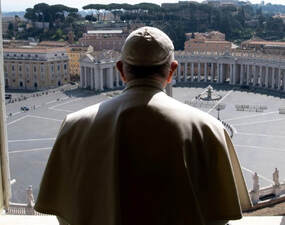
Plague has always been a problem for organized religion. From its earliest origins in the human story, belief in the gods has been a response to things happening that humans can’t control – things like floods, drought and illness. We can’t control these things – but as long as we thought the gods did, we didn’t feel so helpless, especially if we belonged to an organization that claimed to be able to influence them/Him/Her on our behalf.
Until relatively recently in human history, it was believed that illness was a punishment for sin and could be cured by appeasing the gods. Prayer, especially when offered by a priest, was thought to appease them. And on a one by one basis, many people who were prayed for actually did get better, so the idea stuck.
But in an epidemic, where thousands keep getting sick and dying, prayer just doesn’t work. It didn’t then and it doesn’t now.
In the 14th century, the Bubonic Plague caused a major credibility problem for the Catholic Church in Europe. The fact that the plague raged for years and that the clerics were killed off just as fast as the common people undermined the notion that the Church had a monopoly on God’s influence. The result was not a loss of belief in God’s power over disease, but rather a loss of confidence in the authority of Catholic Church. In many ways, this set the groundwork for the Protestant Reformation. The people of Europe started looking for someone with a better connection to God’s ear. The idea that the Plague was a bacteriological disease transmitted by fleas carried by rats would simply not have occurred to anyone, and wouldn’t for another couple of hundred years.
Organized religion is in a similar situation now. The idea that disease is caused by natural phenomenon (bacteria, viruses) and can be treated by natural means (medicine) has been around for the past few hundred years and has been largely successful. But people still go to church and still pray for the sick. The deep needs that religion has addressed for all of human history can’t be addressed by Tylenol.
High on the list of those very real needs is the notion that human life makes sense and that our lives mean more than a bunch of biological processes we share with monkeys. The pandemic is an attack not only on the idea of the “bargaining” function of the Organized Religions, but on the very sense of human meaning they are there to support. If we can be killed off in the hundreds of thousands by mindless, lifeless, microscopic specs that by blind chance are multiplying in our all too human bodies, then how special are we really?
Fortunately, that deeper concern is being answered in great part by the countless acts of service and generosity humans are showing other humans in this crisis. If we’re the kind of species that’s willing to put our own lives on the line to save total strangers, then there must be more to us simple flesh and blood. There is. And that will survive, this virus, the next and more.
What may not survive is the religious bargaining chip. The more established Faiths (Catholicism, Mainline Protestantism, Islam) have responsibly accepted the reality that gathering the Faithful puts the Faithful’s lives at risk, and have shut down (or gone on line) for practically all of their public rituals. The few fundamentalist pastors who promised their followers that God would protect them, and would heed their prayers when they prayed together, have paid a heavy toll, as have their followers. The few in reach of a microphone who have spoken out to claim that the Coronavirus is some kind of Divine punishment have largely been dismissed as ridiculous.
When the dust settles, organized religion as an institution may find itself in the same position the Catholic Church did when Martin Luther nailed his famous theses to the church door. What is different from the fifteen hundreds is that the failure of prayer globally has been witnessed globally, brought into every home on screens provided by human technology. The virus attacks believers and unbelievers alike and everybody knows it. The Churches couldn’t stop it. None of them.
Whether the idea of an “Organized Faith” can survive without its lobbying function is yet to be seen.
Faith will survive. The churches may not.
Consider this a work in progress.
 RSS Feed
RSS Feed